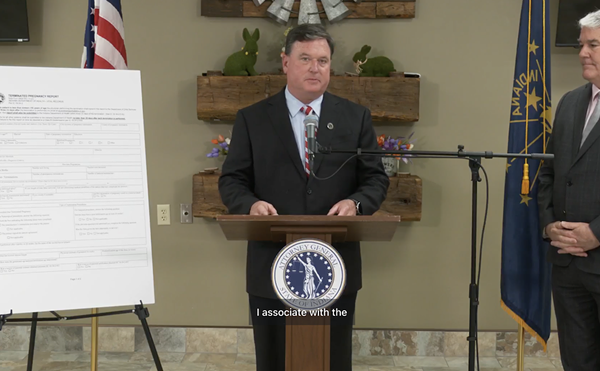Following an ordeal that began in early 2001, Dr. Jonathan Tobias is free to get on with his life, while Thomas Condon might be spending more of his in prison.
The Ohio First District Court of Appeals has reversed Tobias' conviction. A former assistant coroner, he had been convicted of two counts of gross abuse of a corpse for helping Condon take photos of bodies in the Hamilton County Morgue.
"We've taken the position all along that Jonathan was not involved in any criminal wrongdoing," says Marc Mezibov, Tobias' attorney. "One has to wonder: If there was insufficient evidence, what motivated this prosecution?"
The appeals court found that, although Tobias was at the morgue every time Condon was taking photos, there was insufficient evidence that he played an active role in the art project.
"Rather, the most that can be said from the testimony is that Condon and Tobias were friendly with one another, as they were seen together at a neighborhood grocery store and having lunch together, and that Tobias was present at the time the offenses against (two of the deceased) were believed to have occurred," the court ruled.
Appeals Judge Mark Painter wrote that the cases against Tobias and Condon should have had separate trials.
"If the cases had been severed, all the evidence against Condon alone would have been irrelevant in Tobias' separate trial," he wrote. "Tobias was convicted by spillover.
It was a clear abuse of discretion to fail to sever the trials."
Painter criticized Hamilton County Common Pleas Judge Norbert Nadel, who heard the men's trial, on several issues.
"There were myriad other errors in jury instructions, in statements by the prosecutor and in the admission of evidence," Painter wrote. "I agree with my colleagues that these errors are now moot at the appellate level. But without them, the case might not have reached the appellate level."
Mezibov expects Tobias' medical license to be reinstated. It was suspended following his conviction.
"I am very happy with the final outcome and am looking forward to getting on with my life," Tobias says. "The Kafkaesque nightmare of the past two and a half years is finally over. I have achieved the vindication that I so long sought through the untiring efforts of my lawyers, the love and support of my family and friends and the strength that comes with knowing one is innocent. I am also grateful to the appeals court for stopping Hamilton County's misdirected and overly-aggressive case against me."
Condon says that he and his family are happy for Tobias.
"We are very happy that the outcome for him that happened was the one that should have been from the beginning," Condon says.
Hamilton County Prosecutor Mike Allen issued a statement saying he's disappointed that Tobias won his appeal.
"Though we're disappointed that the case against Dr. Tobias was not affirmed, we are deeply respectful to the court for its review," Allen wrote. "On behalf of the decedents and their loved ones, I am gratified that the First District Court of Appeals has affirmed the conviction of Thomas Condon."
Condon now faces the likelihood of a return to prison. The appeals court affirmed his conviction on all eight counts of abuse of a corpse. He'd already served almost six months of a 30-month sentence when he was freed on an appeal bond.
Although upholding his conviction, the appeals court reduced his sentence to 18 months, including time already served.
The appeals judges blasted Condon's argument that his art photos were protected by the First Amendment. Condon posed a key, sheet music and other props on corpses before photographing them.
"Contrary to Condon's argument, the First Amendment did not grant him a right to abuse a corpse for the purpose of his art," the court wrote. "Employing the same logic, Condon would have a perfect right to dig up bodies from their graves if he decided his next project was 'death cycles,' a study of the human body decomposing."
The court rejected Condon's argument that the state failed to prove he knew his photographs would cause outrage.
"Frankly, we find it difficult to believe that Condon can seriously argue that he had no sense that his unauthorized use of the bodies of other people's loved ones for his art project posed a risk of causing outrage, not only among the families, but in the community at large," the court wrote. "Even an overblown sense of the importance of one's own art could not make one oblivious to the impropriety of treating morgue corpses as objects to be freely exploited and posed for their photographic value."
Condon has asked for reconsideration by the appeals court, according to his attorney, Jennifer Kinsley. In sentencing Condon, Nadel improperly took into consideration a lawsuit by relatives of the deceased people Condon photographed, according to Kinsley. The appeals court failed to rule on that issue, she says.
Condon also plans to appeal to the Ohio Supreme Court and ask for a stay on his return to prison pending appeal.
While pleased that Tobias' conviction was overturned, Kinsley questions why Condon's wasn't.
"It looks almost politically motivated," she says.
While agreeing Condon is guilty, Painter dissented on the change in his sentence. He argued that Condon shouldn't go back to prison at all.
"The sentence should have been six months," Painter wrote. "More than that has already been served." ©





